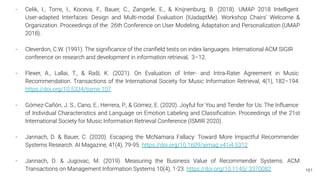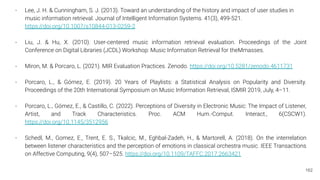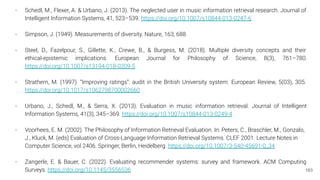The document outlines a tutorial on trustworthy music information retrieval (MIR), emphasizing the ethical and legal considerations necessary for AI systems applied to music. It discusses the importance of human agency, technical robustness, privacy, transparency, diversity, societal impact, and accountability throughout the AI system's lifecycle. Various evaluation strategies for MIR systems that account for multiple stakeholder perspectives and user-centered approaches are also highlighted.





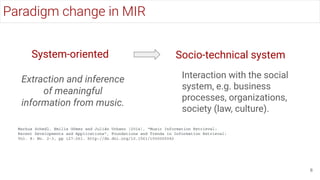
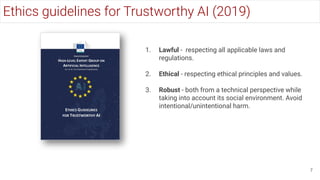
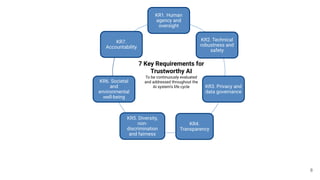
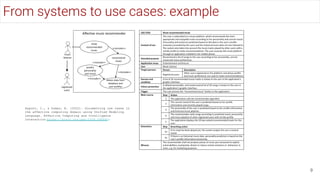
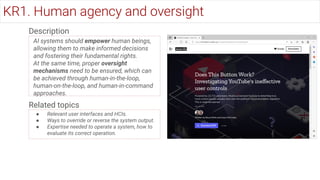
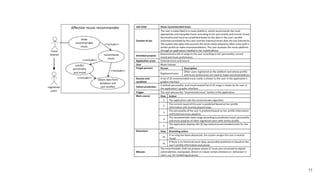
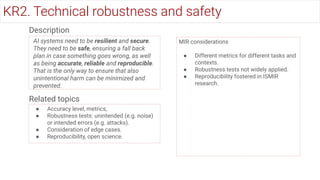
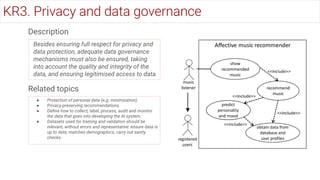
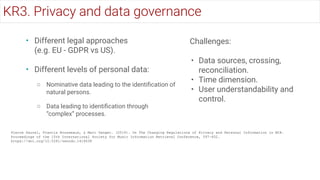
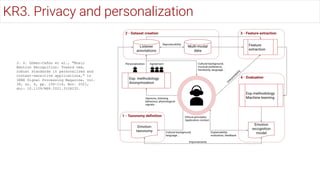
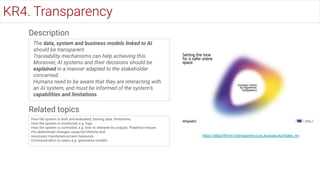
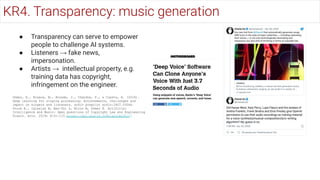
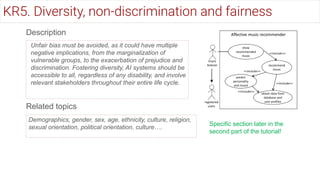
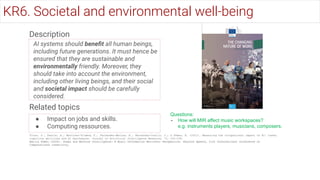
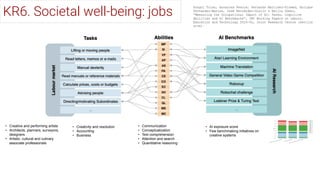
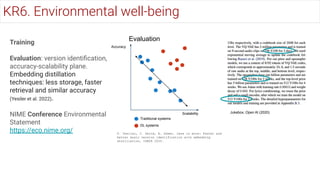
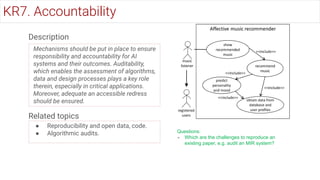
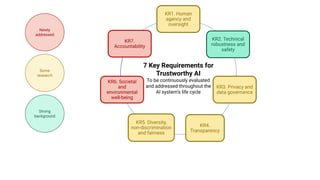
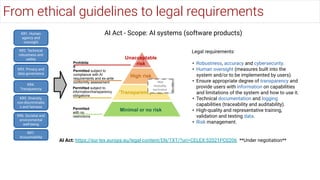
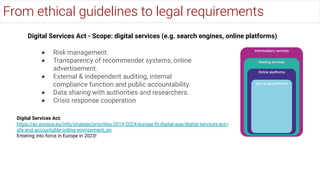
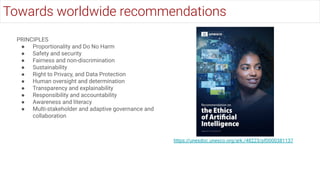







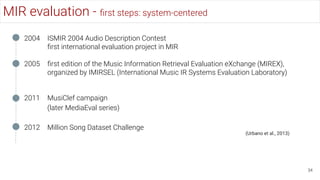
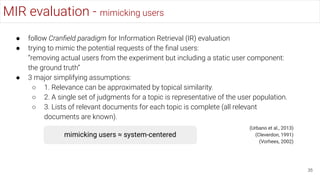
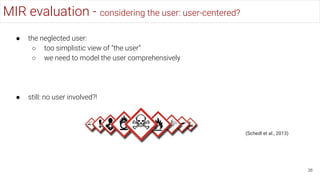

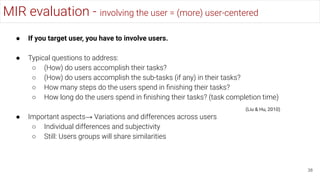
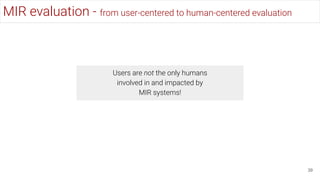
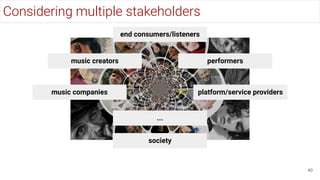
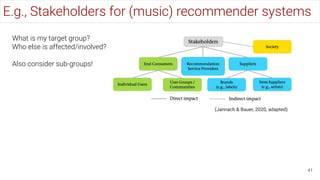
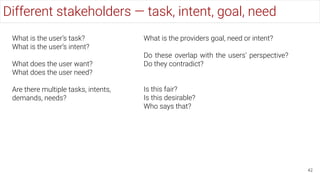
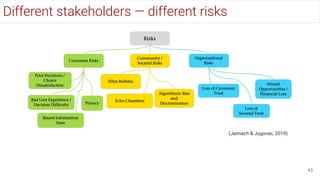

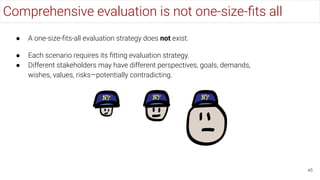
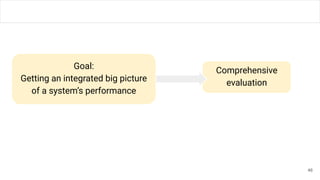
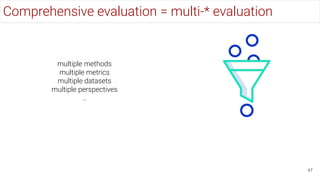


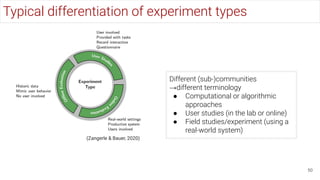
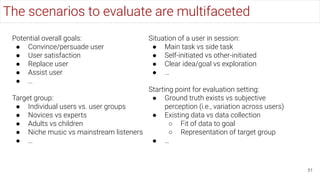



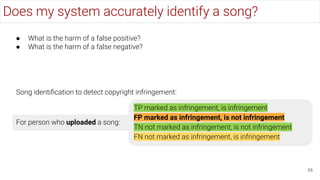
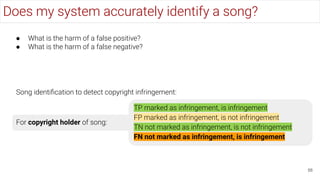
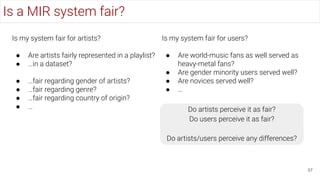


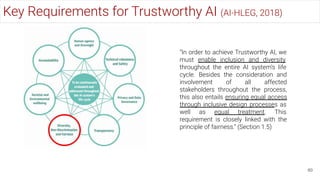
![Recommendation on the Ethics of AI (UNESCO, 2020)
61
“AI actors should promote social justice and safeguard fairness and non-discrimination of any kind [...].
This implies an inclusive approach to ensuring that the benefits of AI technologies are available and
accessible to all, taking into consideration the specific needs of different age groups, cultural systems,
different language groups, persons with disabilities, girls and women, and disadvantaged, marginalized
and vulnerable people or people in vulnerable situations.” (Section III.2, Article 28)](https://image.slidesharecdn.com/trustworthymir-ismir2022tutorial-221205091000-9e83d8b2/85/TRUSTWORTHY-MIR-ISMIR-2022-Tutorial-pdf-61-320.jpg)
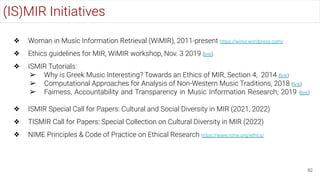

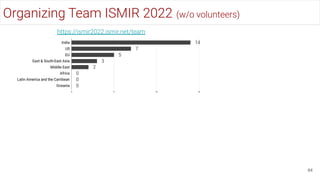
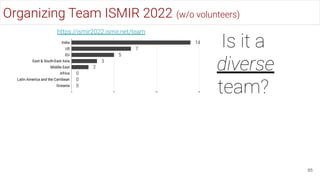
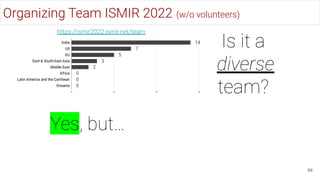
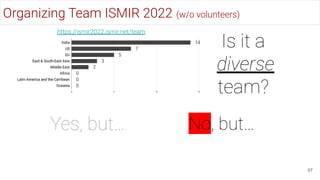

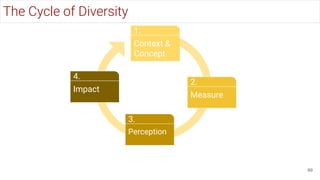
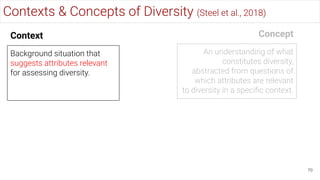
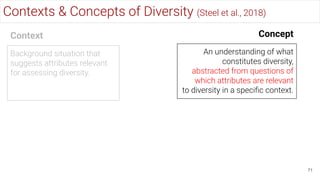
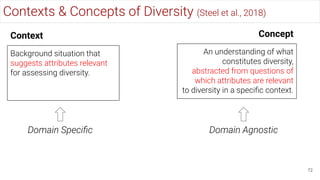
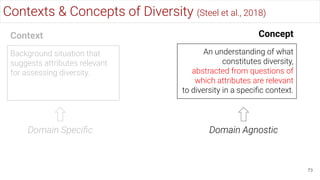







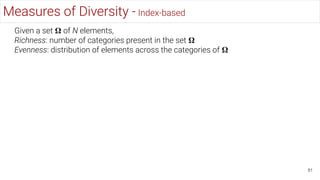
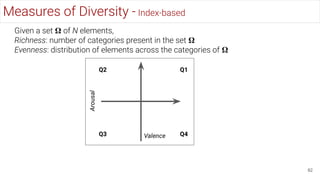
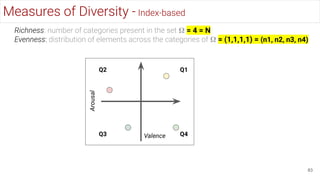
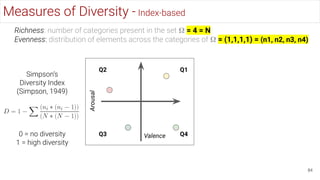
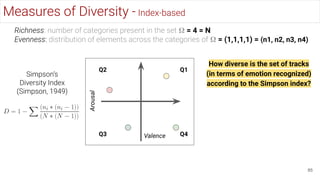
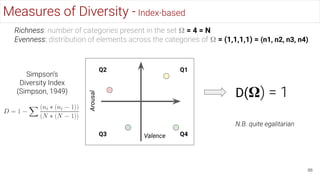
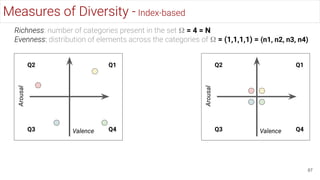
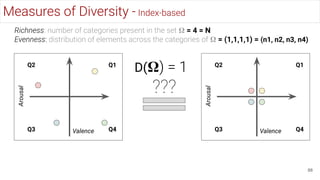
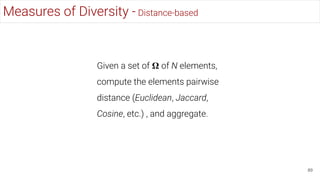
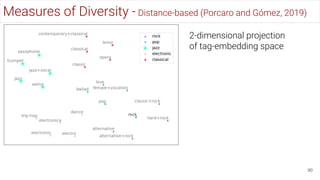
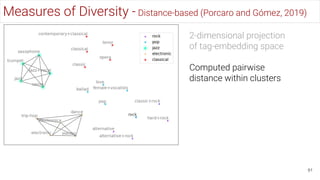
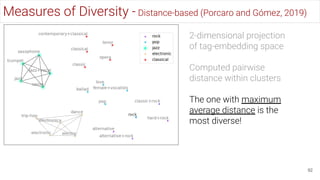
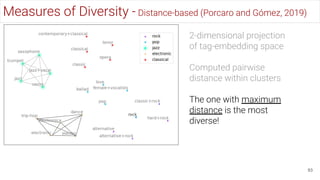
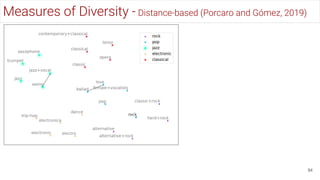
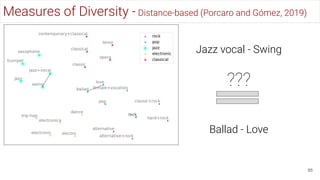




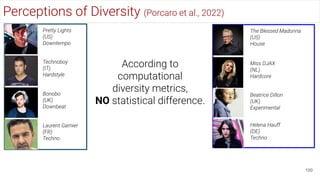






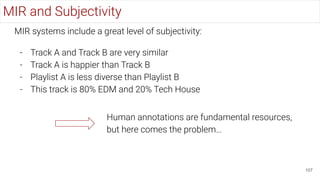
![108
Agreement and Perceptions
- Listeners trained in classical music tend to disagree more on perceived
emotions, than those not trained [Schedl et al., 2018]
- Preference, familiarity, and lyrics comprehension increase agreement for
emotions corresponding to quadrants Q1 and Q3. [Gómez-Cañón et al., 2020]
- Current emotional state of users influences their perception of music similarity
[Flexer et al., 2021]](https://image.slidesharecdn.com/trustworthymir-ismir2022tutorial-221205091000-9e83d8b2/85/TRUSTWORTHY-MIR-ISMIR-2022-Tutorial-pdf-108-320.jpg)

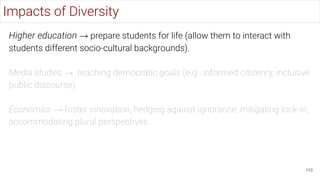
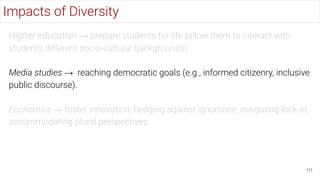
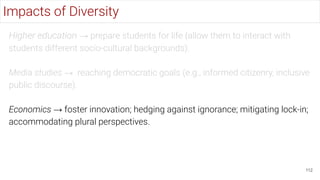
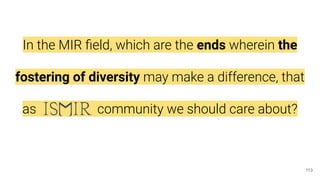

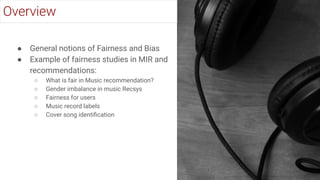
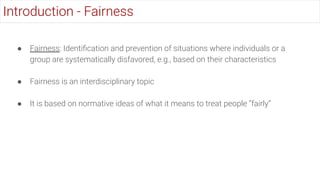
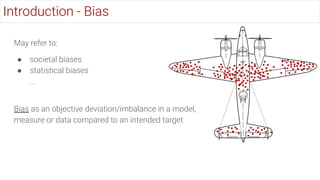
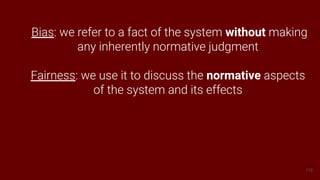
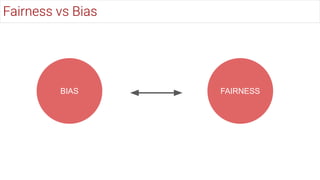
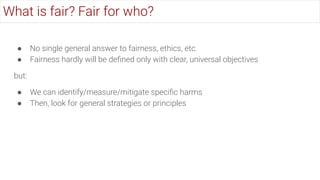
![The ML community has begun to address claims of algorithmic
bias under the rubric of fairness, accountability, and transparency.
We should clearly define:
● Assumptions
● Goals or principles that we are based on
● Methods used to evaluate the ability to meet those goals
● How to assess the relevance and appropriateness of those
goals to the social problem in question
What is fair? Fair for who?
[*] Redistribution and Rekognition: A Feminist Critique of Algorithmic Fairness [West, 2020]](https://image.slidesharecdn.com/trustworthymir-ismir2022tutorial-221205091000-9e83d8b2/85/TRUSTWORTHY-MIR-ISMIR-2022-Tutorial-pdf-121-320.jpg)
![The ML community has begun to address claims of algorithmic
bias under the rubric of fairness, accountability, and transparency.
We should clearly define:
● Assumptions
● Goals or principles that we are based on
● Methods used to evaluate the ability to meet those goals
● How to assess the relevance and appropriateness of those
goals to the social problem in question
What is fair? Fair for who?
[*] Redistribution and Rekognition: A Feminist Critique of Algorithmic Fairness [West, 2020]](https://image.slidesharecdn.com/trustworthymir-ismir2022tutorial-221205091000-9e83d8b2/85/TRUSTWORTHY-MIR-ISMIR-2022-Tutorial-pdf-122-320.jpg)
![● Distributional harm:
Harmful distribution of
resources or outcomes
● Representational harm:
Harmful internal or external
representation
General Concepts - I
Popularity
Recommended
Fairness in Information Access Systems [Ekstrand et al., 2022]](https://image.slidesharecdn.com/trustworthymir-ismir2022tutorial-221205091000-9e83d8b2/85/TRUSTWORTHY-MIR-ISMIR-2022-Tutorial-pdf-123-320.jpg)
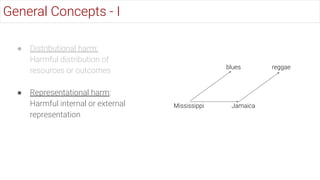
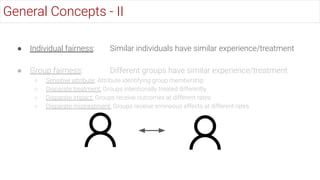
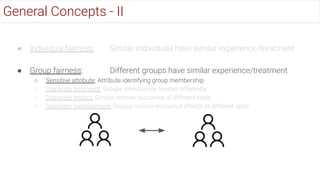
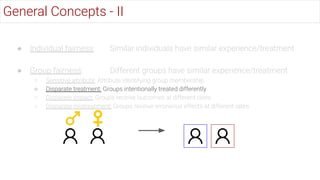
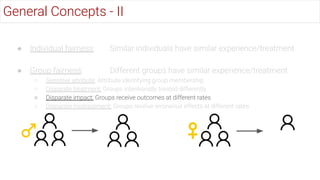
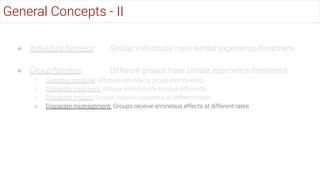
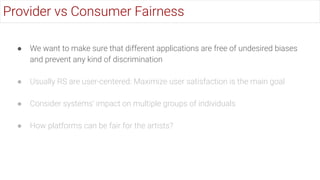
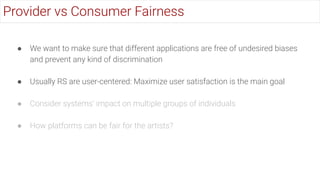
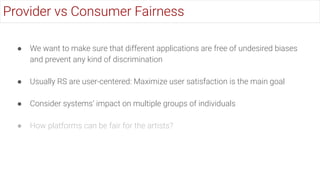
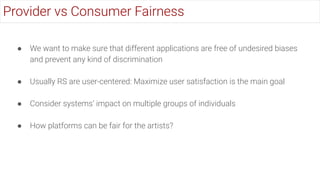
![● The leading questions are:
○ How do artists feel affected by current systems?
○ What do artists want to see improved in future?
○ What concrete ideas or even algorithmic decisions could be adopted in
future systems?
What is fair? exploring the artists' perspective on the fairness of music streaming platforms [Ferraro et al., 2021]
What is fair in Music recommendation?](https://image.slidesharecdn.com/trustworthymir-ismir2022tutorial-221205091000-9e83d8b2/85/TRUSTWORTHY-MIR-ISMIR-2022-Tutorial-pdf-134-320.jpg)
![135
Design of
semi-structured
interviews
Documents
preparation
Selected participants
based on diversity
Conducting
interviews
Interview
transcription
Coding
Analysis of
Results
Methodology - Semi-structured interviews and Qualitative Content Analysis
Qualitative content analysis [Mayring, 2004]](https://image.slidesharecdn.com/trustworthymir-ismir2022tutorial-221205091000-9e83d8b2/85/TRUSTWORTHY-MIR-ISMIR-2022-Tutorial-pdf-135-320.jpg)
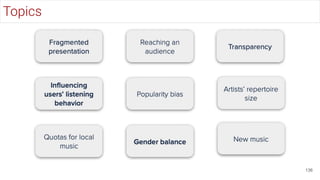
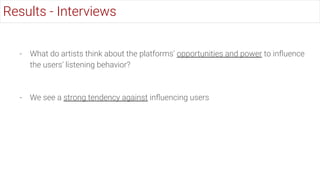



![141
"[...] the population of the world is 50% women. So it
would be ridiculous if the system wouldn’t recommend
them.”](https://image.slidesharecdn.com/trustworthymir-ismir2022tutorial-221205091000-9e83d8b2/85/TRUSTWORTHY-MIR-ISMIR-2022-Tutorial-pdf-141-320.jpg)
![Based the interviews we focus on the topic of gender balance
● Qualitative approach:
○ Artists express that platforms should promote gender balance
● Quantitative approach:
○ Using 2 datasets of user listening data, evaluate how different users’ history is compared to the
(CF) recommendations
○ What is the effect in user consumption in the long term?
142
Break the Loop: Gender Imbalance in Music Recommenders [Ferraro, et al., 2021]
Gender Imbalance in Music Recsys](https://image.slidesharecdn.com/trustworthymir-ismir2022tutorial-221205091000-9e83d8b2/85/TRUSTWORTHY-MIR-ISMIR-2022-Tutorial-pdf-142-320.jpg)
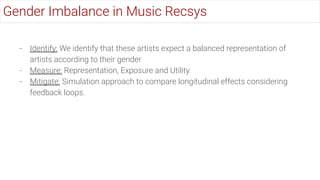
![- 3 sources of unfairness:
- Representation: Similar proportion to users history
- Exposure: Users have to put more effort to reach the first female artist in the recommendation
- Utiliy: Model make more “mistakes” for female artists than for male artists
Similar results in:
Exploring Artist Gender Bias in Music Recommendation [Shakespeare et al., 2020]
Gender Imbalance in Music Recsys - Results](https://image.slidesharecdn.com/trustworthymir-ismir2022tutorial-221205091000-9e83d8b2/85/TRUSTWORTHY-MIR-ISMIR-2022-Tutorial-pdf-144-320.jpg)

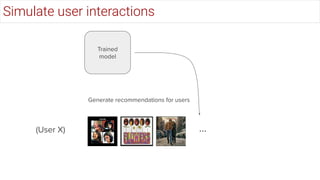
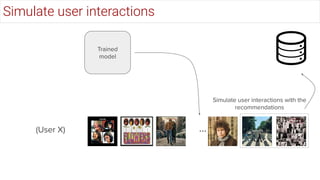
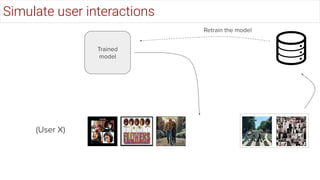
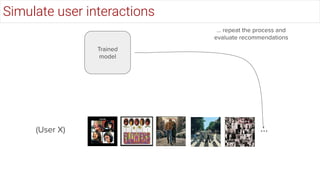

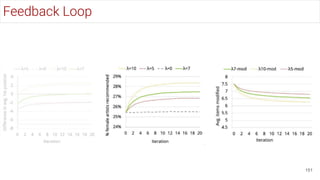
![- Exploring Longitudinal Effects of Session-based Recommendations. In Proceedings of
the 14th ACM Conference on Recommender Systems [Ferraro, Jannach & Serra, 2020]
- Consumption and performance: understanding longitudinal dynamics of recommender
systems via an agent-based simulation framework [Zhang et al., 2019]
- Longitudinal impact of preference biases on recommender systems’ performance [Zhou,
Zhang, & Adomavicius, 2021]
- The Dual Echo Chamber: Modeling Social Media Polarization for Interventional
Recommending [Donkers & Ziegler, 2021]
152
References - Simulations](https://image.slidesharecdn.com/trustworthymir-ismir2022tutorial-221205091000-9e83d8b2/85/TRUSTWORTHY-MIR-ISMIR-2022-Tutorial-pdf-152-320.jpg)
![- Exploring User Opinions of Fairness in Recommender Systems [Smith et al.,
2020]
- Fairness and Transparency in Recommendation: The Users’ Perspective
[Sonboli et al., 2021]
- The multisided complexity of fairness in recommender systems [Sonboli et al.,
2022]
References - Fairness for Users](https://image.slidesharecdn.com/trustworthymir-ismir2022tutorial-221205091000-9e83d8b2/85/TRUSTWORTHY-MIR-ISMIR-2022-Tutorial-pdf-153-320.jpg)
![- The Unfairness of Popularity Bias in Music Recommendation: A Reproducibility
Study [Kowald, Schedl & Lex, 2020]
- Support the underground: characteristics of beyond-mainstream music
listeners [Kowald et al., 2021]
- Analyzing Item Popularity Bias of Music Recommender Systems: Are Different
Genders Equally Affected? [Lesota et al., 2021]
References - Unfairness for users](https://image.slidesharecdn.com/trustworthymir-ismir2022tutorial-221205091000-9e83d8b2/85/TRUSTWORTHY-MIR-ISMIR-2022-Tutorial-pdf-154-320.jpg)
![Bias and Feedback Loops in Music Recommendation: Studies on Record Label
Impact [Knees, Ferraro & Hübler, 2022]
Music Record Labels](https://image.slidesharecdn.com/trustworthymir-ismir2022tutorial-221205091000-9e83d8b2/85/TRUSTWORTHY-MIR-ISMIR-2022-Tutorial-pdf-155-320.jpg)
![Music Record Labels
Bias and Feedback Loops in Music Recommendation: Studies on Record Label
Impact [Knees, Ferraro & Hübler, 2022]](https://image.slidesharecdn.com/trustworthymir-ismir2022tutorial-221205091000-9e83d8b2/85/TRUSTWORTHY-MIR-ISMIR-2022-Tutorial-pdf-156-320.jpg)
![Music Record Labels
Bias and Feedback Loops in Music Recommendation: Studies on Record Label
Impact [Knees, Ferraro & Hübler, 2022]](https://image.slidesharecdn.com/trustworthymir-ismir2022tutorial-221205091000-9e83d8b2/85/TRUSTWORTHY-MIR-ISMIR-2022-Tutorial-pdf-157-320.jpg)
![Assessing Algorithmic Biases for Musical Version Identification [Yesiler et al., 2022]
- Multiple stakeholders: Composers and other artists
- Compare 5 systems
- Use different attributes of the songs/artists
They Identify algorithmic biases in cover song id. systems that may lead to differences in
performance (dis)favor different groups of artists, e.g.:
- Tracks after 2000 work better
- Larger gap between release year lead to worse performance
- Learning-based systems perform better for underrepresented artists
Cover Song Identification](https://image.slidesharecdn.com/trustworthymir-ismir2022tutorial-221205091000-9e83d8b2/85/TRUSTWORTHY-MIR-ISMIR-2022-Tutorial-pdf-158-320.jpg)
![Assessing Algorithmic Biases for Musical Version Identification [Yesiler et al., 2022]
- Multiple stakeholders: Composers and other artists
- Compare 5 systems
- Use different attributes of the songs/artists
They Identify algorithmic biases in cover song id. systems that may lead to differences in
performance (dis)favor different groups of artists, e.g.:
- Tracks after 2000 work better
- Larger gap between release year lead to worse performance
- Learning-based systems perform better for underrepresented artists
Cover Song Identification](https://image.slidesharecdn.com/trustworthymir-ismir2022tutorial-221205091000-9e83d8b2/85/TRUSTWORTHY-MIR-ISMIR-2022-Tutorial-pdf-159-320.jpg)

